StarFire™ 7500 Receiverwith SF-RTK Signal
- RTK-like accuracy – 2.5 cm pass to pass accuracy
- SF-RTK achieves 73% faster pull-in times1, compared to SF3 signal
- Long-term repeatability, season to season
- Drop-in replacement for StarFire™ 6000 Receiver
 StarFire 7500 receiver
StarFire 7500 receiver
When it comes to large agricultural, small agriculture and turf customers, the StarFire 7500 receiver is precise – allowing for repeatable placement of machines, fertilizer, seed, and herbicides.
*All comparisons made to the StarFire 6000 with SF3
 StarFire™ 7500 Receiver
StarFire™ 7500 Receiver
The StarFire 7500 Receiver offers a new correction level with accuracy like RTK Radio. The SF-RTK correction level provides 2.5-cm (1-in.) horizontal accuracy without the need for additional hardware. This is an improvement of 17 percent from the previous generation of StarFire receiver with SF3. The SF-RTK signal uses two additional satellite constellations (BeiDou and Galileo) as well as both GPS (United States) and GLONASS (Russia) satellites.
The StarFire 7500 and StarFire 7500 Integrated Receivers simultaneously track correction signals from up to three StarFire correction satellites. The receiver tracks and uses correction signals from all StarFire satellites in view and intelligently chooses one that delivers the best performance. When the receiver moves into an area where the primary StarFire signal is blocked, such as near a tree line, the receiver automatically switches to an alternate StarFire signal (if visible) to help maintain accuracy and performance.
NOTE: Compare this to the previous StarFire 3000 Receiver that was only capable of tracking one StarFire signal at a time and could wait up to 4 minutes to initiate the switch to the next available signal.
Repeatability defines how accurately the receiver calculates its position over a relatively long-term window.
NOTE: SF-RTK uses satellite corrections only and does not require the use of an RTK Radio. RTK Radio may still be required in the following scenarios:
John Deere’s latest satellite correction offering provides customers with simplified access to Radio RTK like accuracy and repeatability. Prior to SF-RTK, customers had to purchase additional hardware, RTK Ready or Permanent Licenses, and in most use cases work with a local John Deere dealer to access their base station network to use Radio RTK.
SF-RTK eliminates that complexity through offering the same level of accuracy and repeatability from the sky! Plus, with SF-RTK there’s no need to switch base stations when moving between fields like seen with Radio RTK.
What does SF-RTK do?
The StarFire 7500 utilizes four GNSS satellite constellations, which are corrected through John Deere’s StarFire network to provide sub-inch horizontal accuracy. This provides customer’s our highest accuracy level, along with long-term repeatability (where applicable) to enable advanced guidance features and the confidence that guidance lines and boundaries won't shift from year to year.
Why should customers use SF-RTK?
Customers are continually looking for simplified solutions that deliver the value needed for their operation. SF-RTK offers a lower cost of entry for customers compared to Radio RTK, making this solution an easy decision for customers looking to use a high precision correction signal. Why pay for additional hardware, permanent licenses and base station access fees when SF-RTK only requires a yearly license to operate on your StarFire 7000 or StarFire 7500 receiver.
SF-RTK vs. Radio RTK vs. Mobile RTK (on a StarFire 7500)
Requirements to use SF-RTK
Requirements to use Radio RTK
|
Requirements to use Mobile RTK (through 4G LTE Modem). Availability limited to select countries.
|
|
SF1 |
SF-RTK |
RTK |
Documentation |
X |
X |
X |
AutoTrac™ automated steering |
X |
X |
X |
Section Control |
X |
X |
X |
| Overlap control | X | X | X |
AutoTrac RowSense™ system |
X | X | X |
AutoTrac Turn Automation |
--- | X | X |
AutoTrac Vision guidance |
--- | X | X |
Machine Sync |
X | X | X |
In-Field Data Sharing (guidance lines sharing) |
--- | X | X |
AutoPath™ software |
--- | X | X |
AutoTrac Implement Guidance |
--- | X | X |
Land leveling |
--- | --- | X |
StarFire 7500 and StarFire 7500 Integrated Receiver horizontal pass-to-pass accuracy:
| Pull-in time | Pass-to-pass accuracy | |
| StarFire 7500 – SF1 About 8 minutes |
 |
 |
| StarFire 7500 – SF-RTK 8 minutes or less |
 |
|
| StarFire 7500 Integrated – SF-RTK 8 minutes or less |
||
| StarFire 7500 – RTK Less than 1 minute |
 |
|
 John Deere mRTK Signal enables precision navigation throughout a golf course
John Deere mRTK Signal enables precision navigation throughout a golf course
John Deere Mobile RTK Signal is now compatible with the StarFire™ 7500 Receiver. John Deere mRTK is ideal for customers needing precise navigation in situations where direct line of site to satellites is impeded by dense tree areas and/or hilly terrains, such as a golf course.
This solution utilizes RTK correction data from the John Deere Mobile RTK network. A machine equipped with a John Deere Modular Telematics Gateway (MTG) and JDLink™ connectivity enabled can connect through the JDLink cellular network and John Deere Mobile RTK network to get repeatable RTK correction data wherever the coverage of both networks is available.
Requirements
John Deere Mobile RTK Requires:
Coverage Map
John Deere Mobile RTK Network Coverage can be found at the link below.
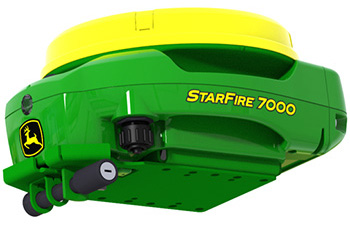 StarFire 7000 and 7500 Locking Bracket- BPF12459
StarFire 7000 and 7500 Locking Bracket- BPF12459
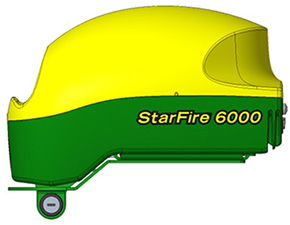 StarFire 6000 Locking Bracket - BPF12464
StarFire 6000 Locking Bracket - BPF12464
Introducing the new StarFire Receiver Locking Brackets – Our latest innovation features robust metal brackets and components, replacing the older plastic parts. This upgrade significantly enhances the receiver's security, making it much harder to dislodge. The new and improved locking bracket provides added protection against theft and vandalism. The new design allows for a customer-provided 5/8-inch tubular hitch lock, offering superior safety compared to the previous universal key system.
Locking your StarFire receiver provides enhanced security and peace of mind. By securing the receiver with a robust locking mechanism, you significantly reduce the risk of theft or tampering. This ensures that your equipment remains in place and functions reliably, ultimately protecting your investment and maintaining the integrity of your operations.
Please note that the locking bracket kit does not include the receiver hoop bracket and tubular hitch lock. Here are the parts that are included:
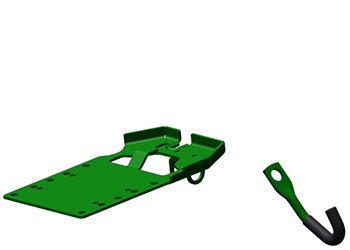 StarFire 7000 and 7500 Locking Bracket parts
StarFire 7000 and 7500 Locking Bracket parts
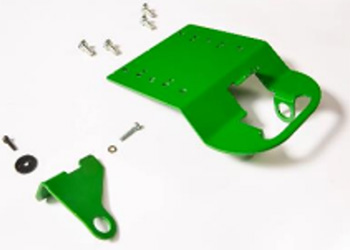 StarFire 6000 Locking Bracket parts
StarFire 6000 Locking Bracket parts
Many factors contribute to the time it takes to achieve desired accuracy from the StarFire™ receiver. Global Navigation Satellite System (GNSS) signal quality can be a contributor, especially when multipath errors occur. Multipath errors occur when satellite signals reflect off nearby surfaces. When the receiver antenna captures a multipath signal, it takes time for the receiver to filter out actual GNSS signal directly from the satellite versus reflected signal from a nearby object. This contributes to the time it takes to achieve desired accuracy.
 Choke plate
Choke plate
The choke plate hardware in the StarFire 7500 Receiver more accurately directs GNSS signals into the antenna. With the addition of this choke plate, there is a 73 percent reduction in the time it takes to acquire an SF-RTK correction signal from previous generations of StarFire receivers. This means you have more time to be productive and get the job done quicker.
The StarFire 7500 and StarFire 7500 Integrated Receiver use an integrated terrain compensation module (TCM) to adjust the calculated machine position based on the terrain on which it is operating. The TCM adjusts for roll, pitch, and yaw motion to improve receiver and AutoTrac™ system performance when operating in challenging conditions such as hilly ground.
As accuracy and repeatability continue to be more important to get to plant-by-plant accuracy, the systems in place today must evolve to enable this capability. Like the StarFire 6000 and StarFire 7000, the StarFire 7500 offers an Advanced TCM Calibration feature.
Benefits:
How it works:
 Advanced TCM Calibration page in the display
Advanced TCM Calibration page in the display
This completes the calibration.
Compatibility:
With Ethernet connectivity on the StarFire 7500 Integrated Receiver, you can save up to 60 minutes per year while performing over-the-air software updates to keep your technology in sync with the latest features
With the StarFire™ 7500 Receiver and SF-RTK correction level, you can have confidence from year to year that your guidance lines and boundaries will stay where they need to be.
StarFire 7500 and StarFire 7500 Integrated repeatability:
NOTE: Repeatability may be impacted by large unpredictable geological events such as earthquakes.
Repeatability defines how accurately the receiver calculates its position over a relatively long timeframe. Repeatability is measured at the receiver and does not take into account additional error sources such as AutoTrac™ control system error, ground conditions, or implement drift.
In-season repeatability is critical when using AutoTrac for multiple jobs throughout the growing season, such as creating AutoTrac guidance lines during planting, then using those same guidance lines to complete subsequent jobs like side dressing fertilizer, post-emerge spraying, and harvesting.
Long-term repeatability is critical when mapping interior and exterior boundaries for later use as input to John Deere Section Control on planters, sprayers, and fertilizer applicators. It is also critical for growers that use the same AutoTrac guidance lines over multiple seasons for operations like subsurface-drip irrigation, controlled traffic, or alternating planter spacing between the rows from a previous season.
 StarFire™ 7500 Receiver
StarFire™ 7500 Receiver
NOTE: Data collected when running a StarFire 7500 Receiver base with a StarFire 7500 rover.
NOTE: RTK Radio still requires the use of a compatible radio.
As John Deere continues to advance their technology, the StarFire™ 7500 receivers are designed with modular components, making the unit a drop-in replacement for the previous generation of integrated receiver. You never have to worry about having outdated hardware.
 StarFire 7500 Integrated Receiver
StarFire 7500 Integrated Receiver
 StarFire 7500 Universal Receiver
StarFire 7500 Universal Receiver
The StarFire 7500 Universal Receiver has more than 20 parts that are completely serviceable. In the unlikely event that there is a problem with the system, many of the individual components can be replaced without replacing everything. This saves you time and money that can be used in other areas of your operation.
Shared signal enables the pairing of two receivers and facilitates communication between them to improve relative system accuracy when utilizing AutoTrac™ Implement Guidance (ATIG), Active Implement Guidance™ (AIG), Machine Sync, or AutoPath™ (AP) advanced precision ag technologies.
Supported configurations:
The following receivers are compatible with shared signal and can be used interchangeably.
NOTES:
Leader Examples: The tractor running ATIG, AP, or AIG, or the combine/pull-type harvester using Machine Sync.
Follower Examples: The implement that is part of an ATIG, AP, or AIG operation, or the grain cart tractor in a Machine Sync operation.
To ensure optimal performance and compatibility, always update receivers to the most current software version available on the StellarSupport™ portal. The leader and follower must be on the same software version. The following table describes the accuracy expected from this system:
Leader receiver activation level |
Follower receiver activation level |
Overall system accuracy level |
Machine Sync Compatible |
SF-RTK/SF3 |
SF1 |
SF-RTK/SF3 |
Yes |
RTK |
SF1 |
RTK |
Yes |
RTK |
SF-RTK/SF3 |
RTK |
Yes |
SF-RTK/SF3 |
RTK |
SF-RTK/SF3 |
Yes |
SF1 |
RTK |
SF1 |
Yes |
Mobile RTK Signal* |
SF1/SF3/ |
RTK |
Yes |
*John Deere Mobile RTK is not available on the StarFire 7000 receivers.
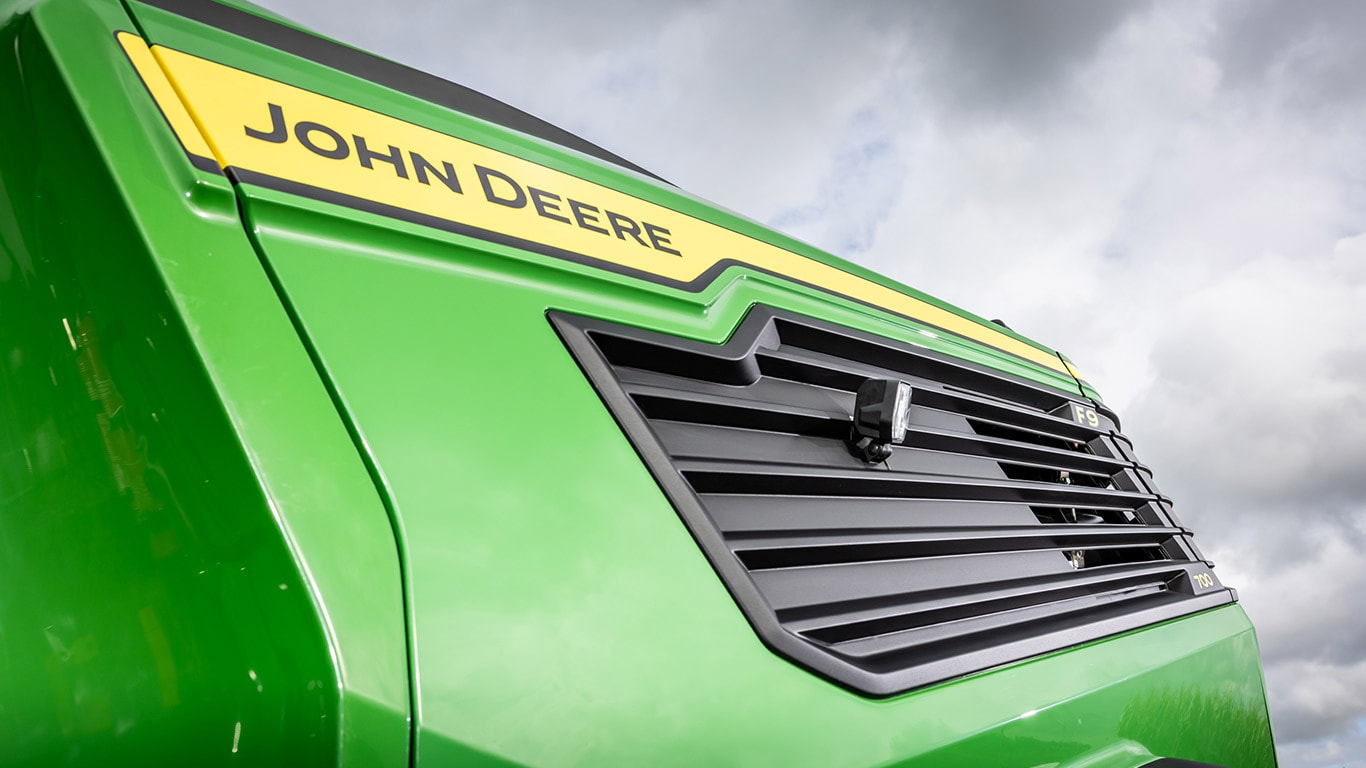
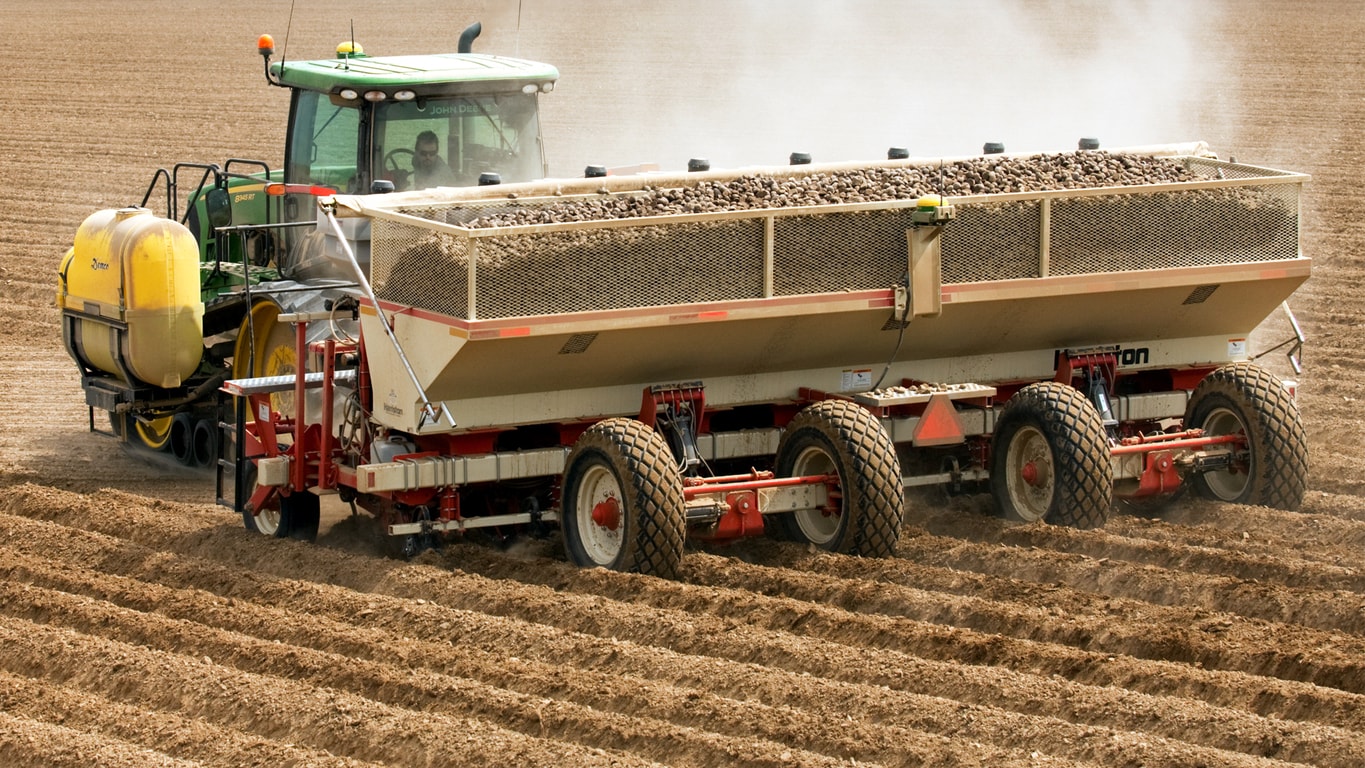
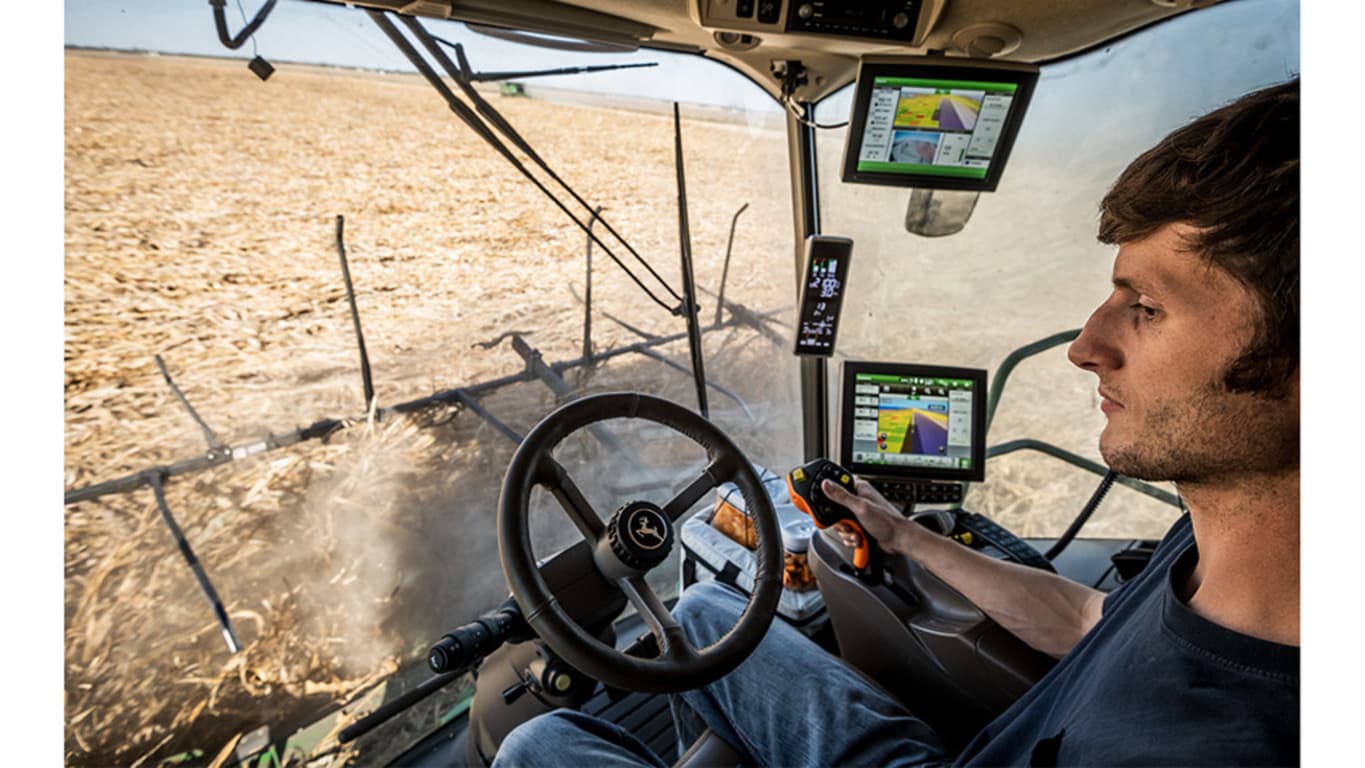
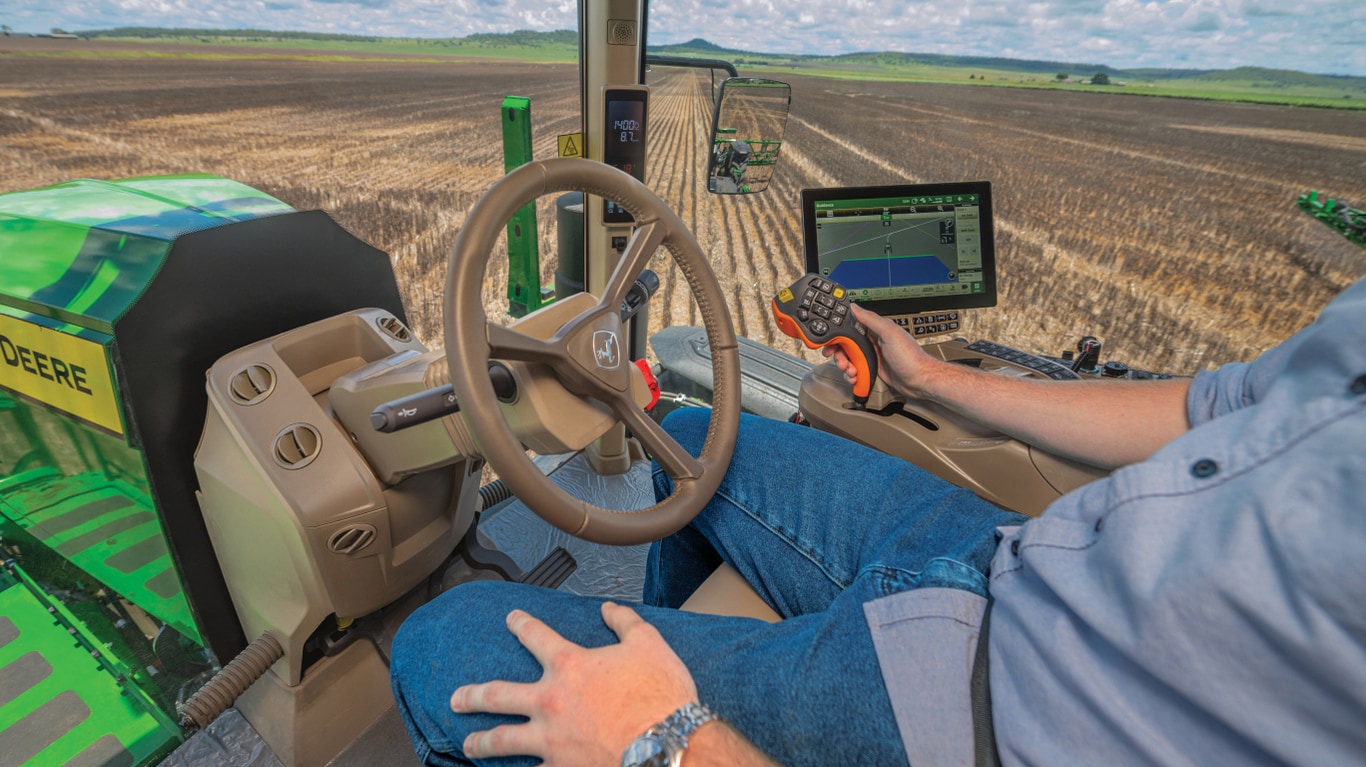
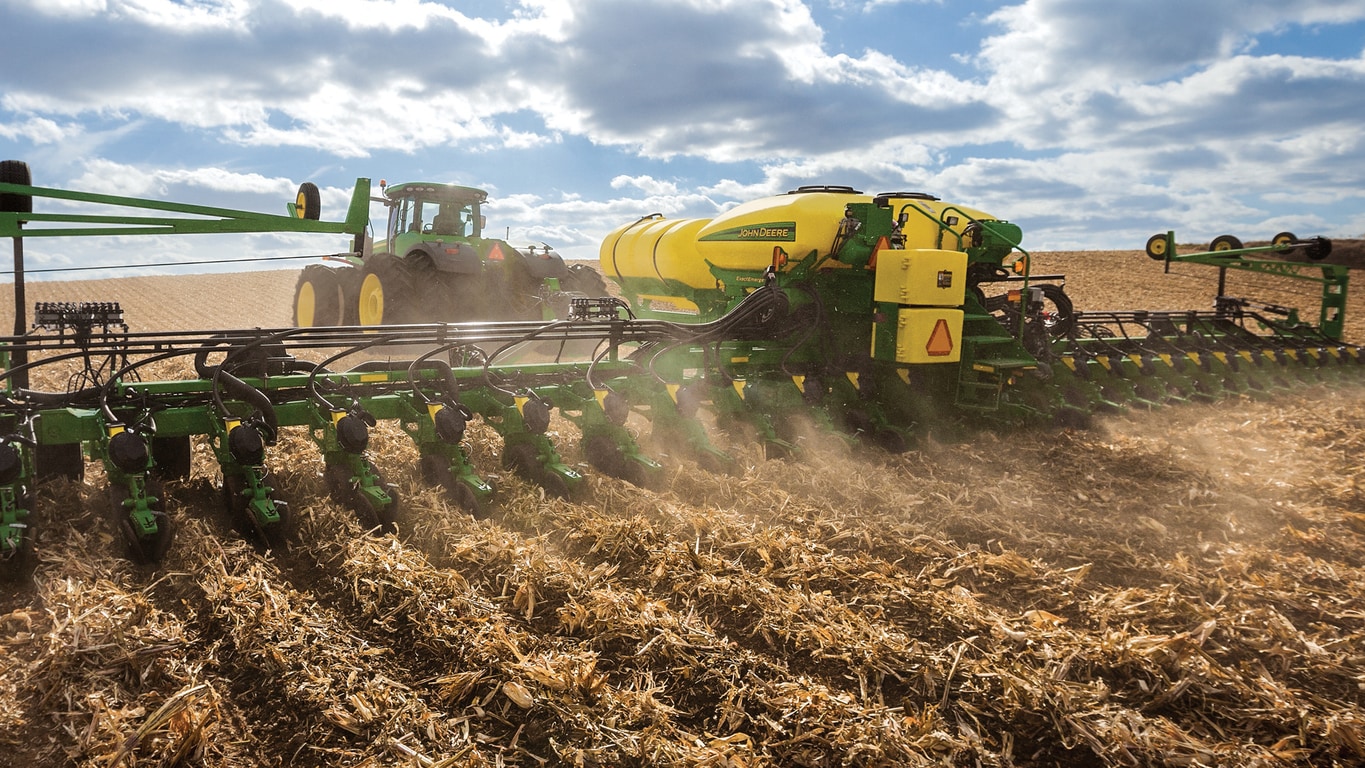
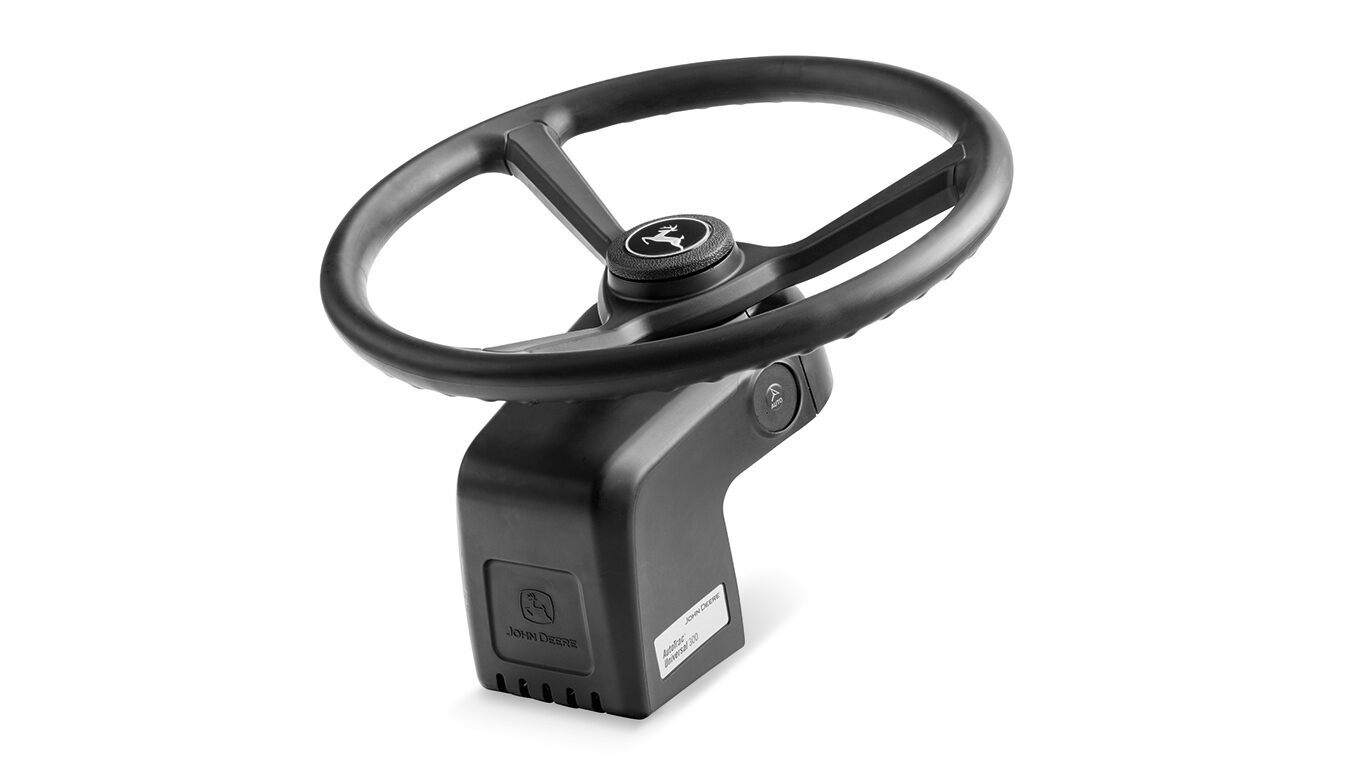
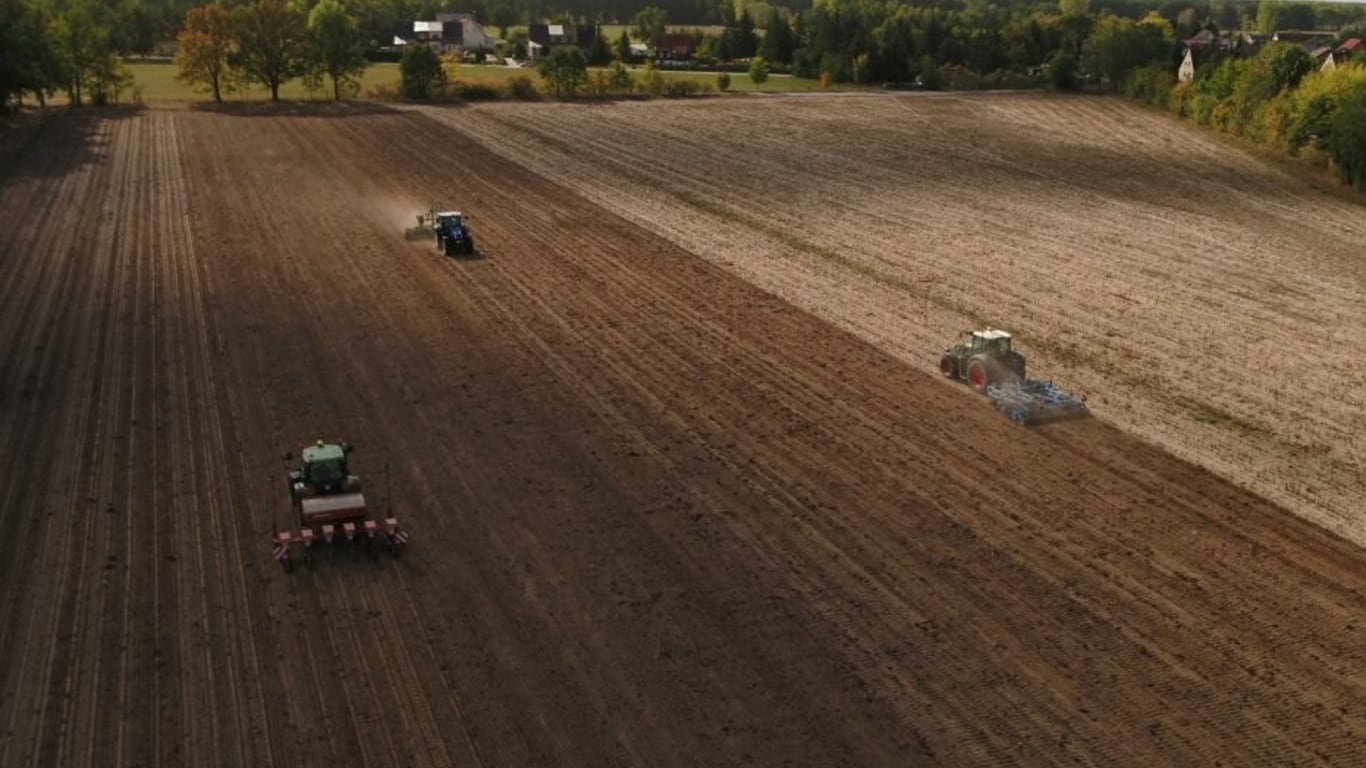
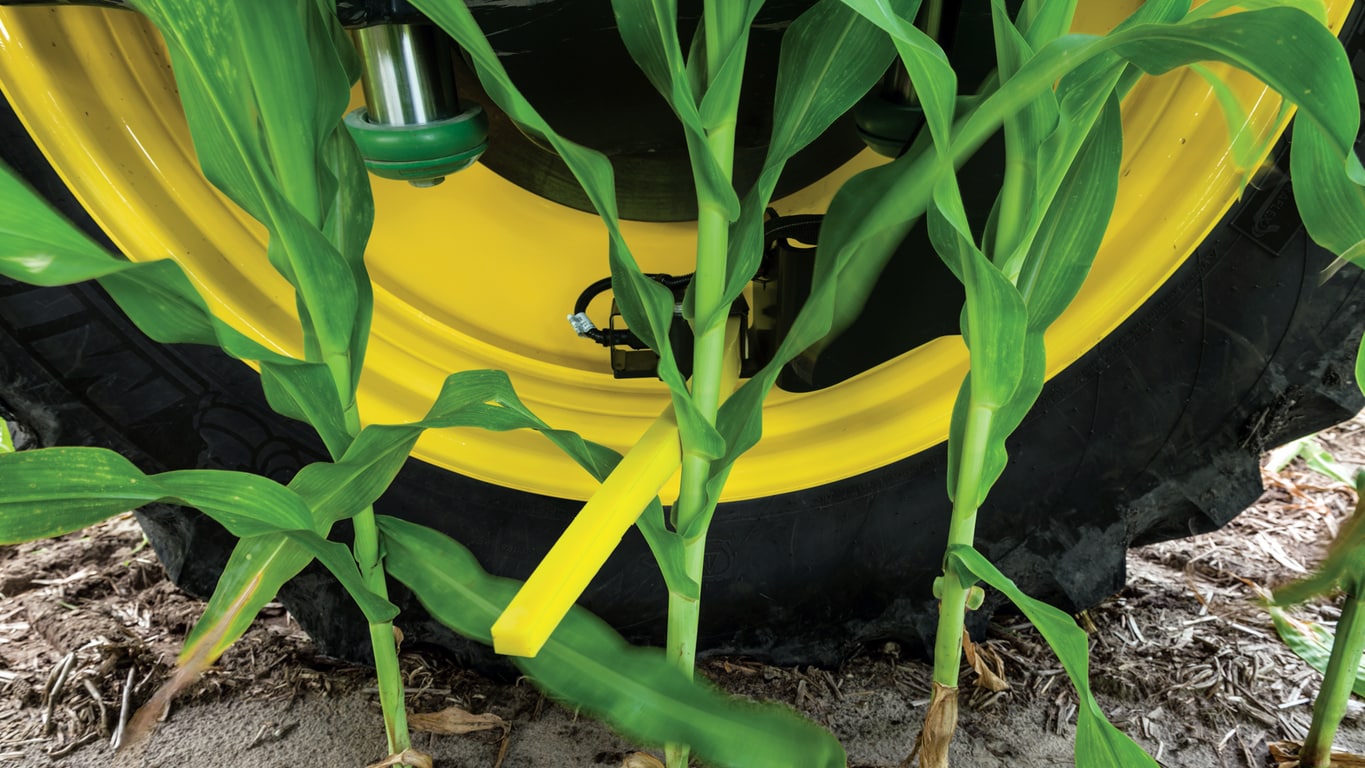
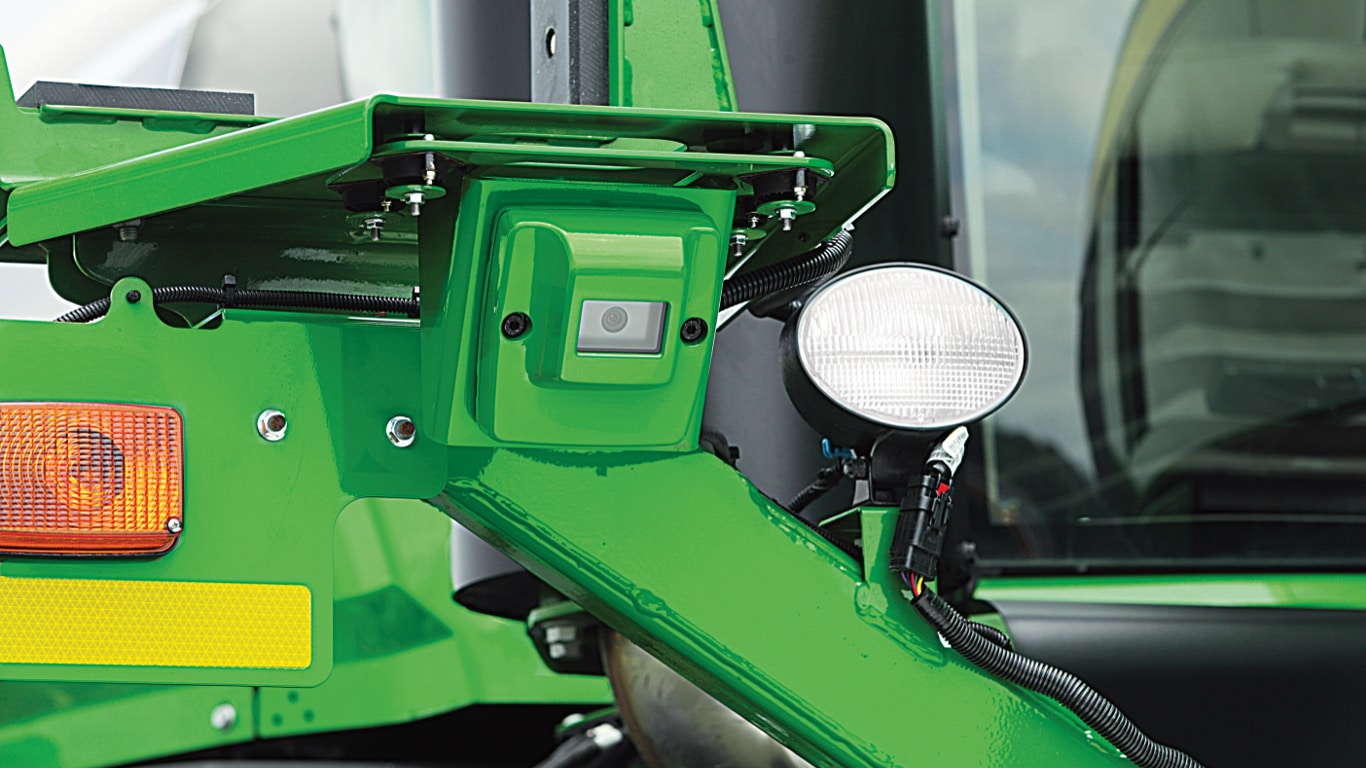
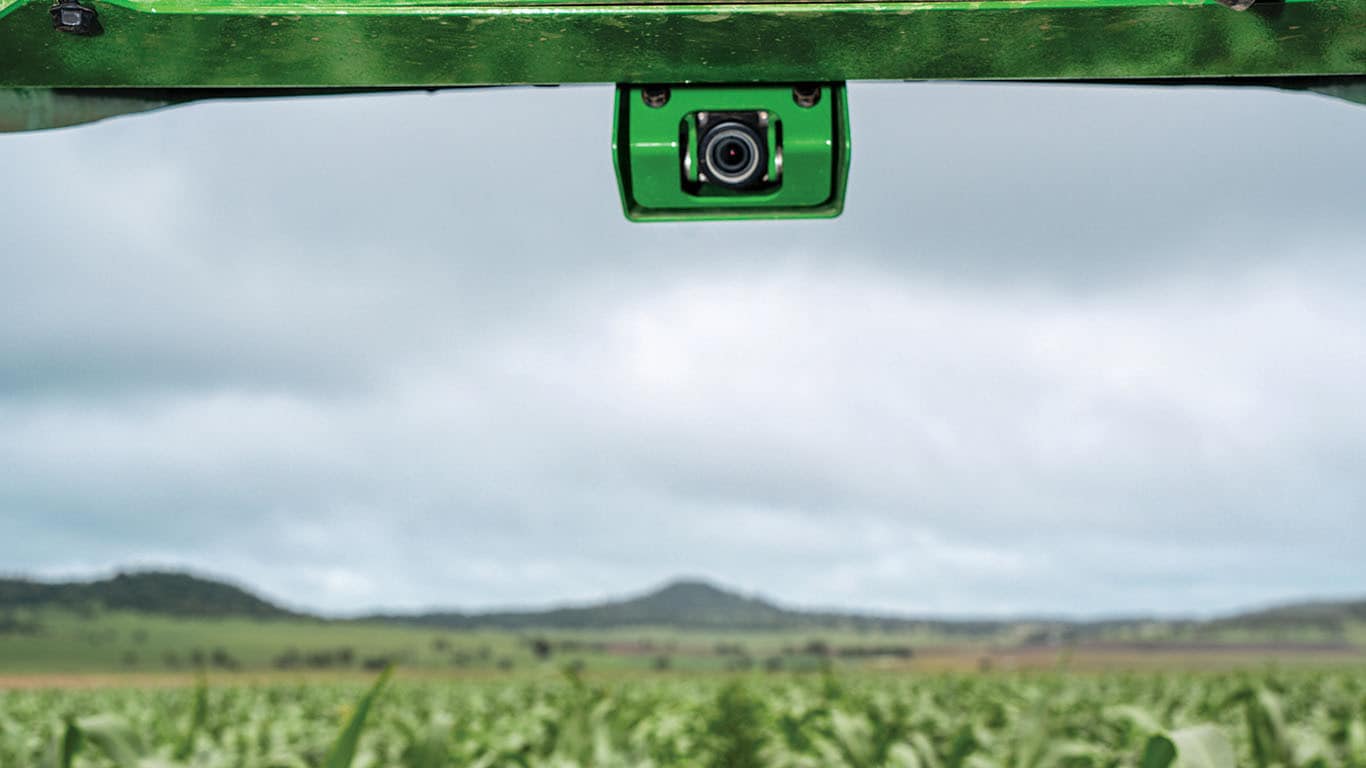
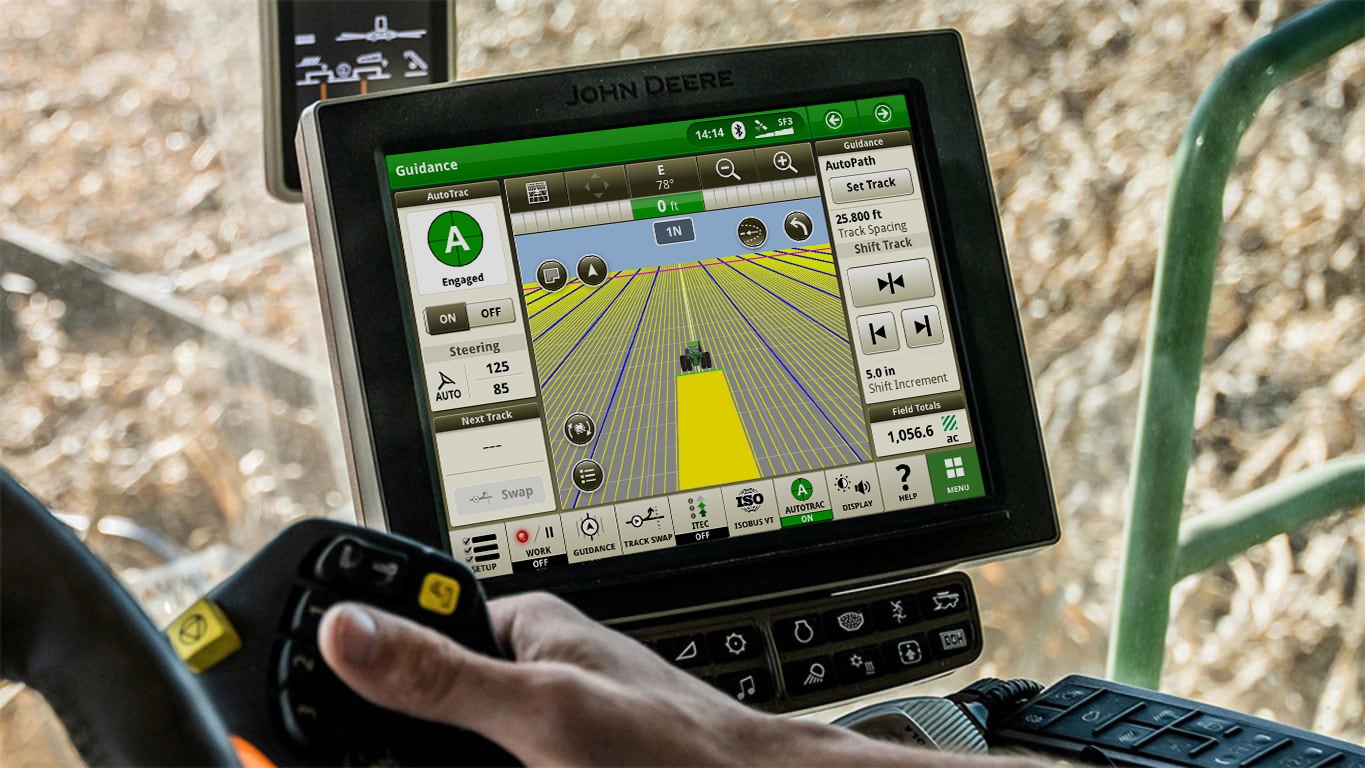
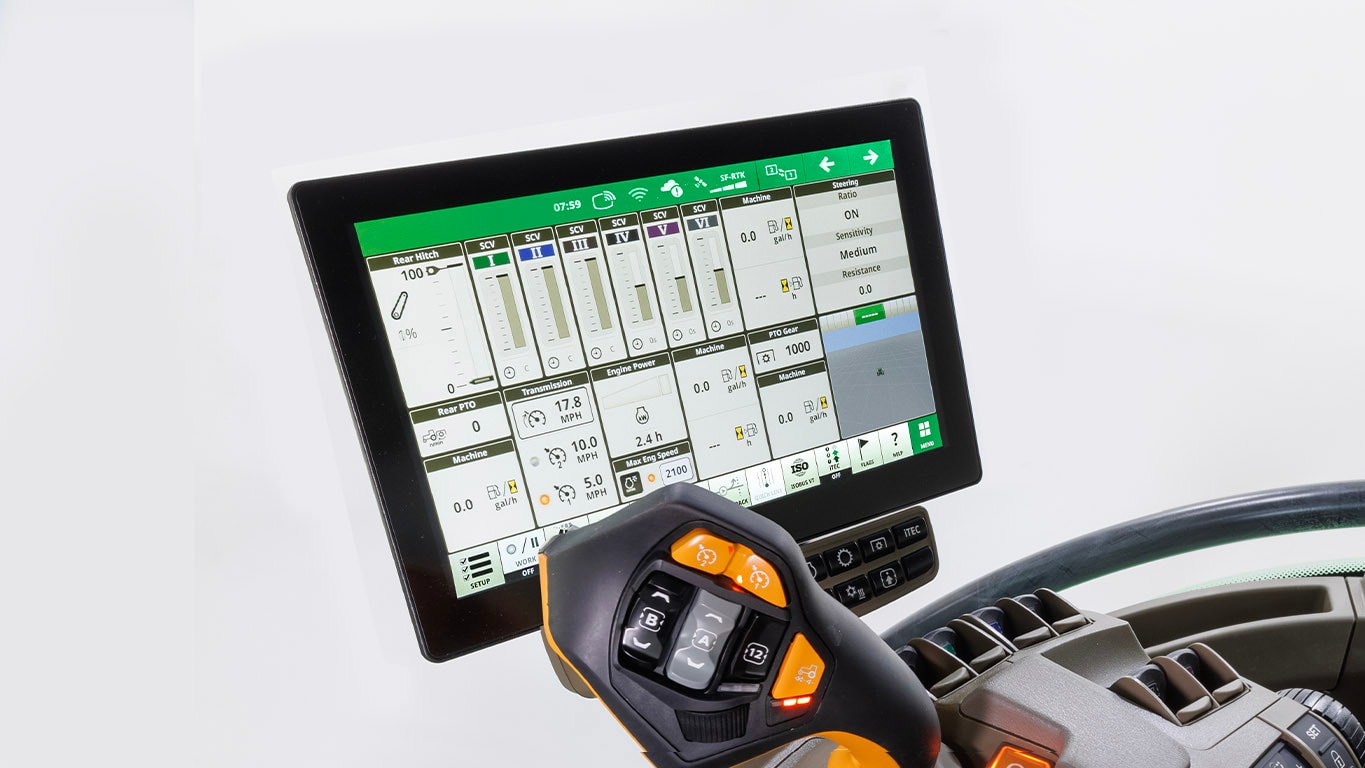
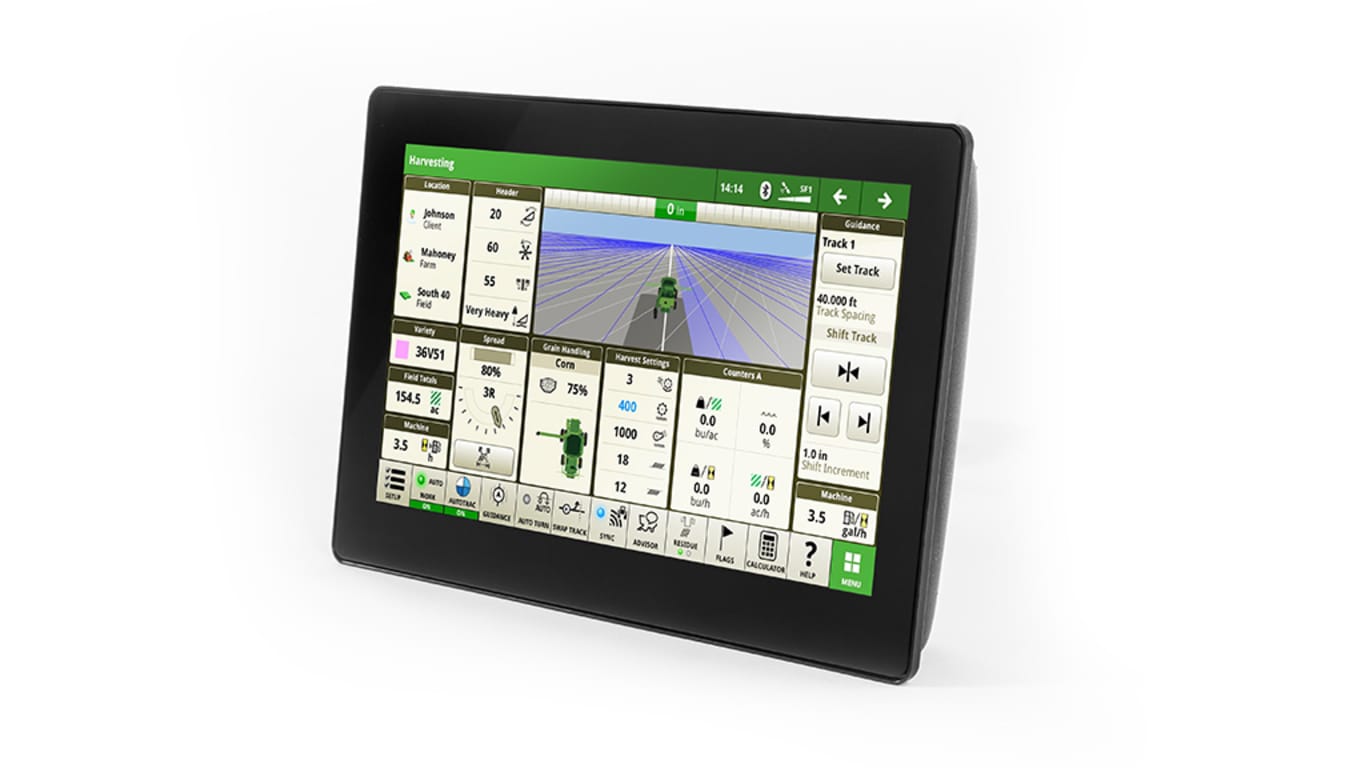
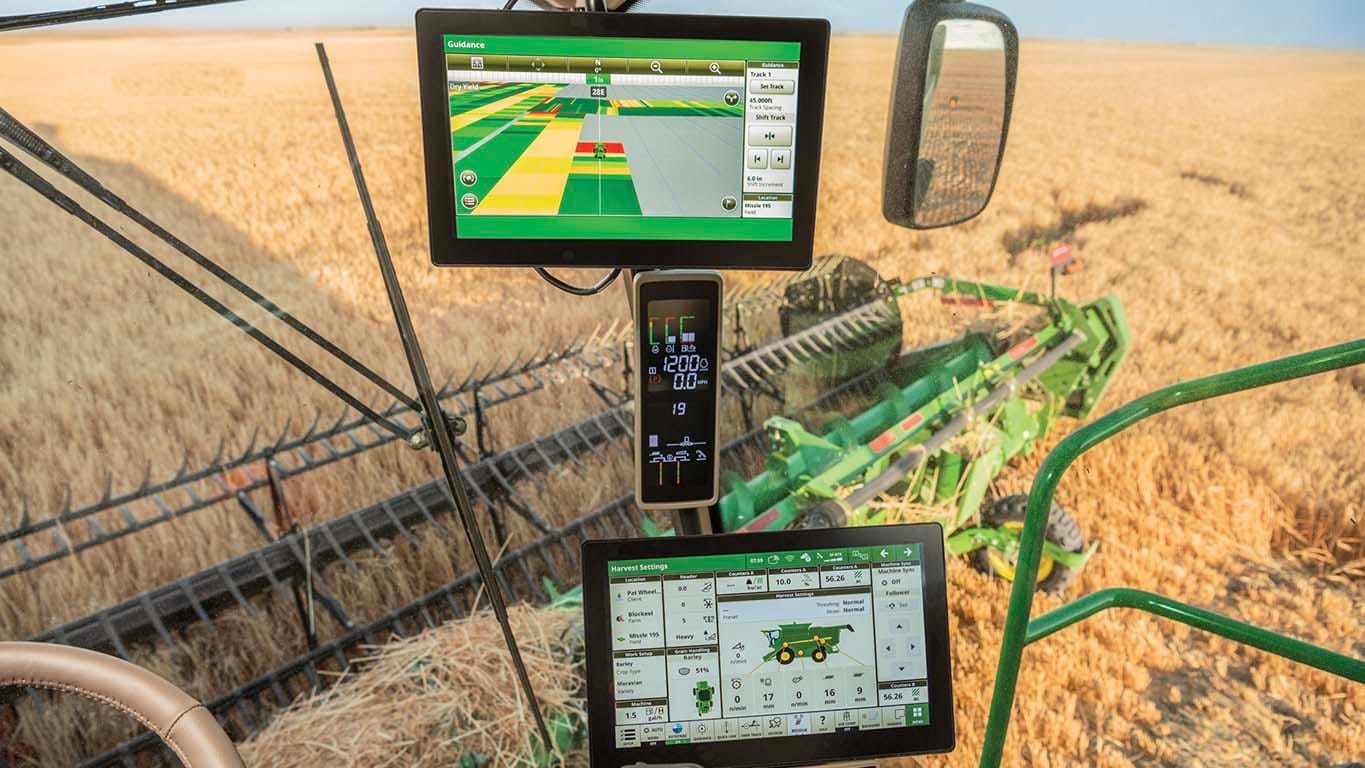
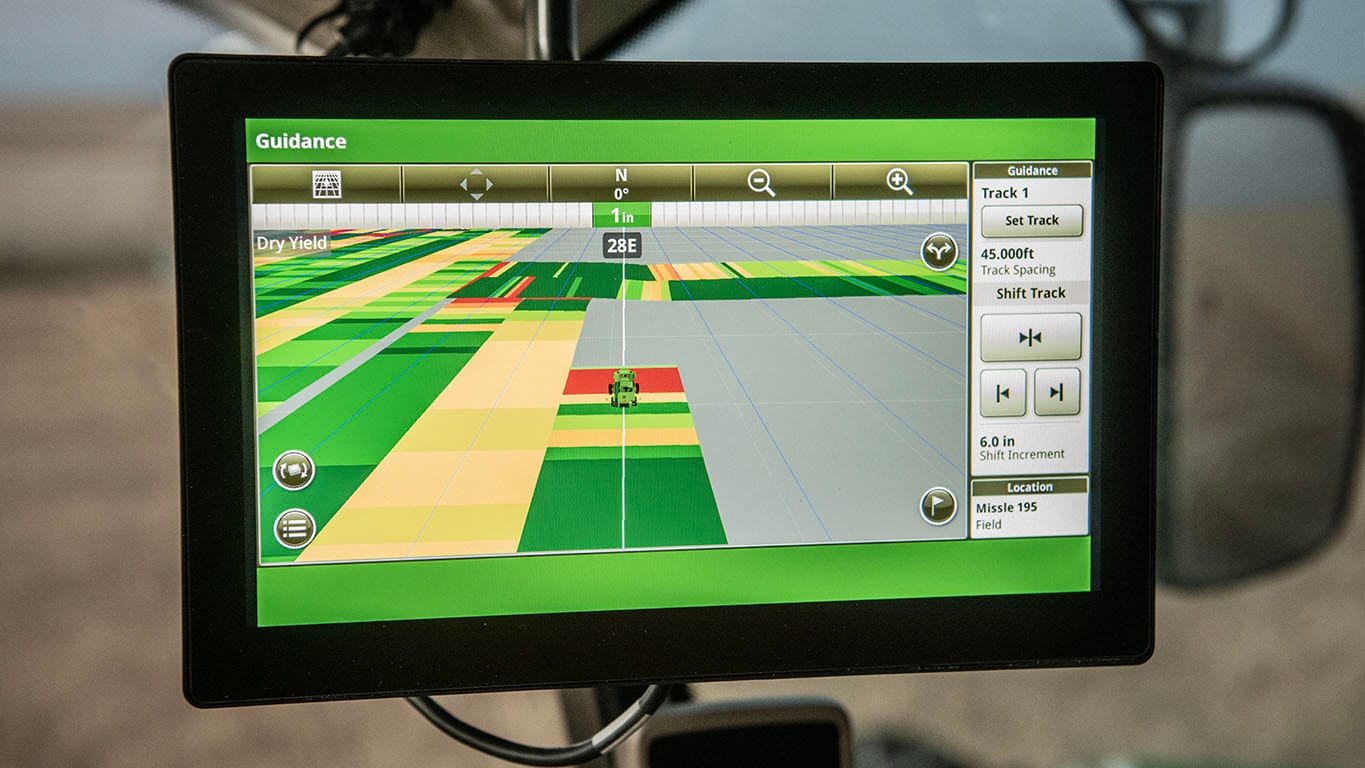
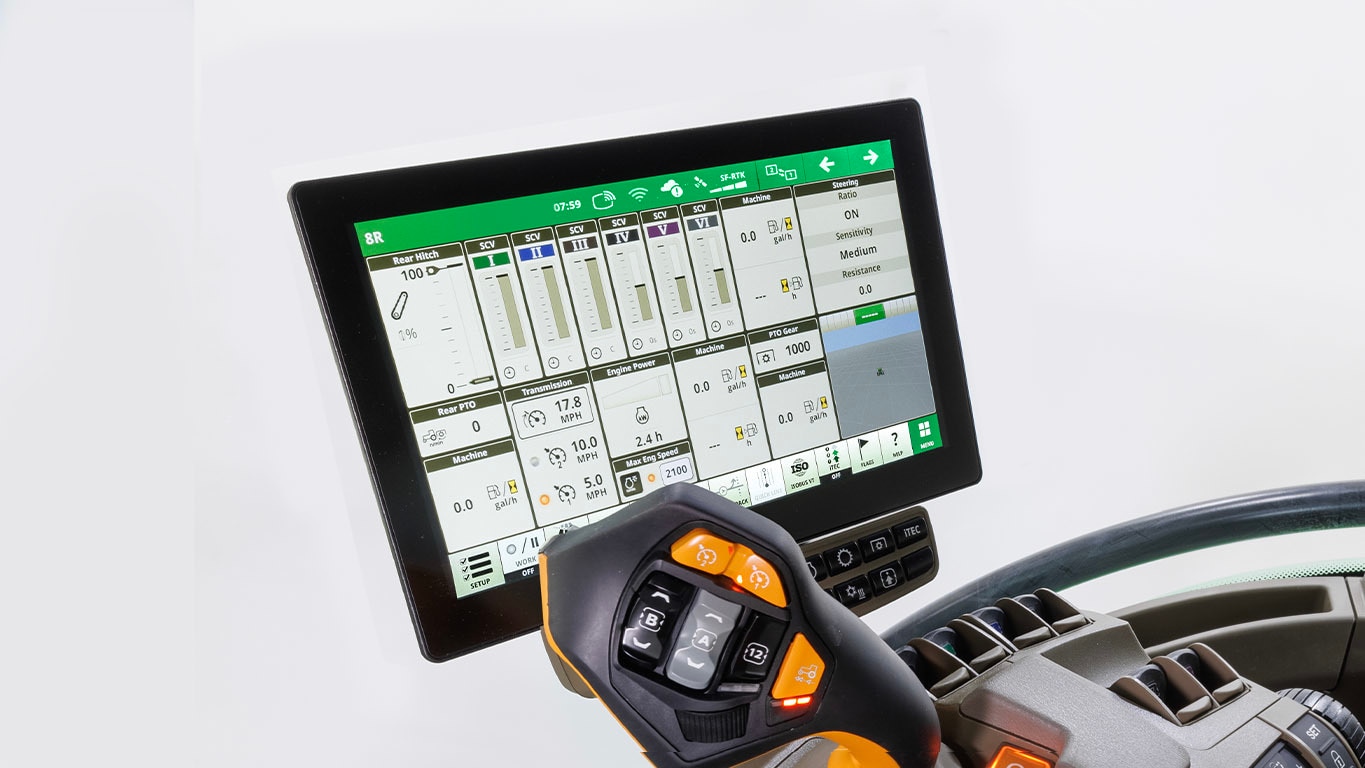
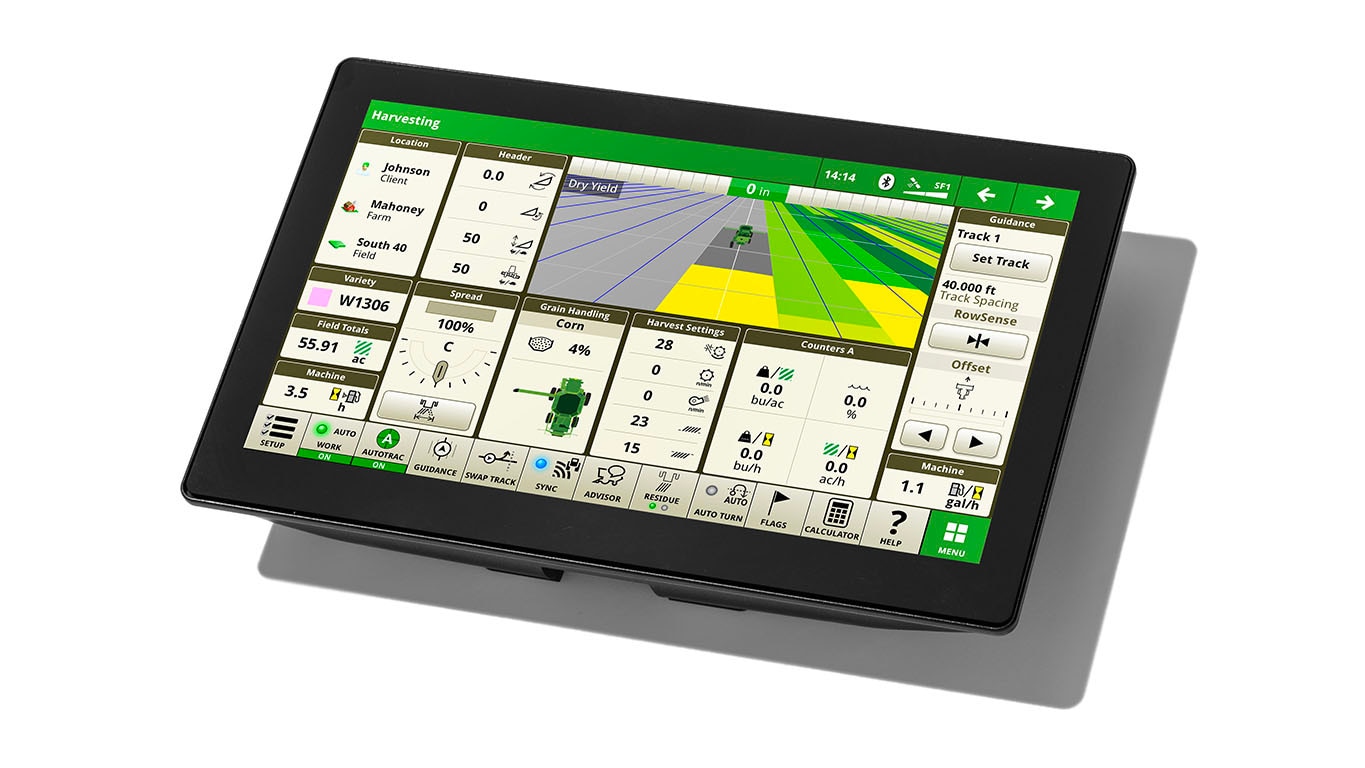
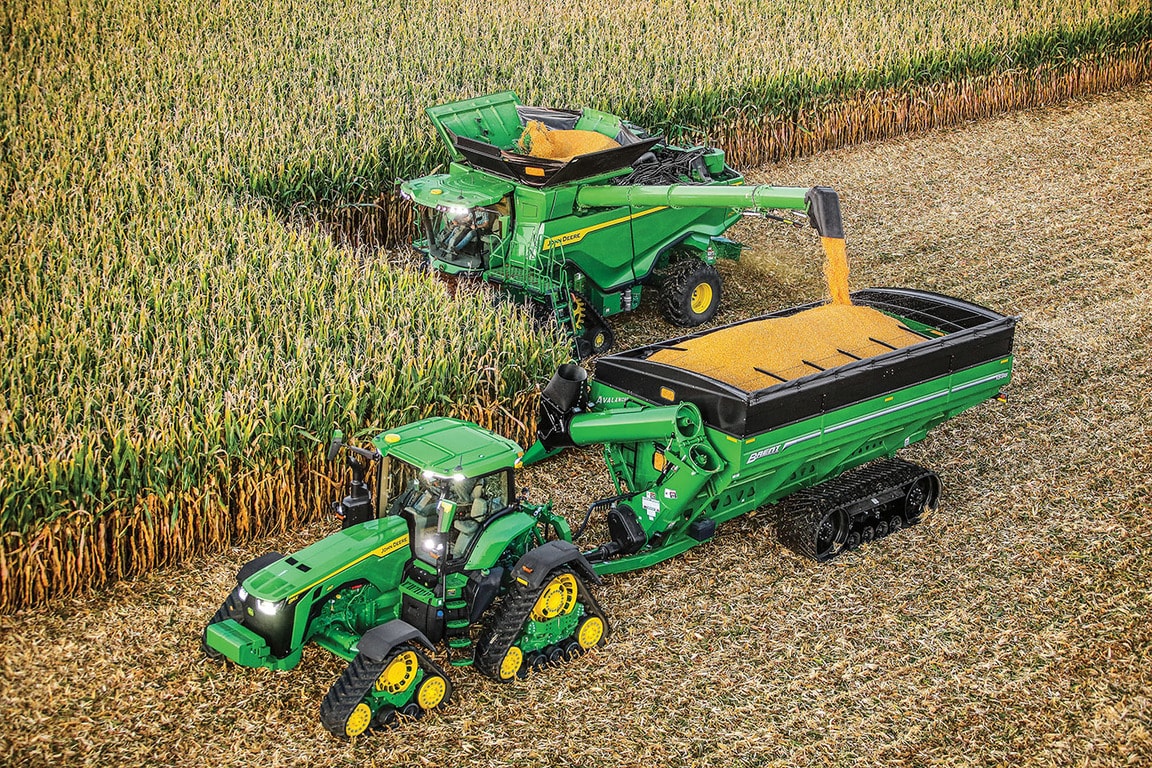
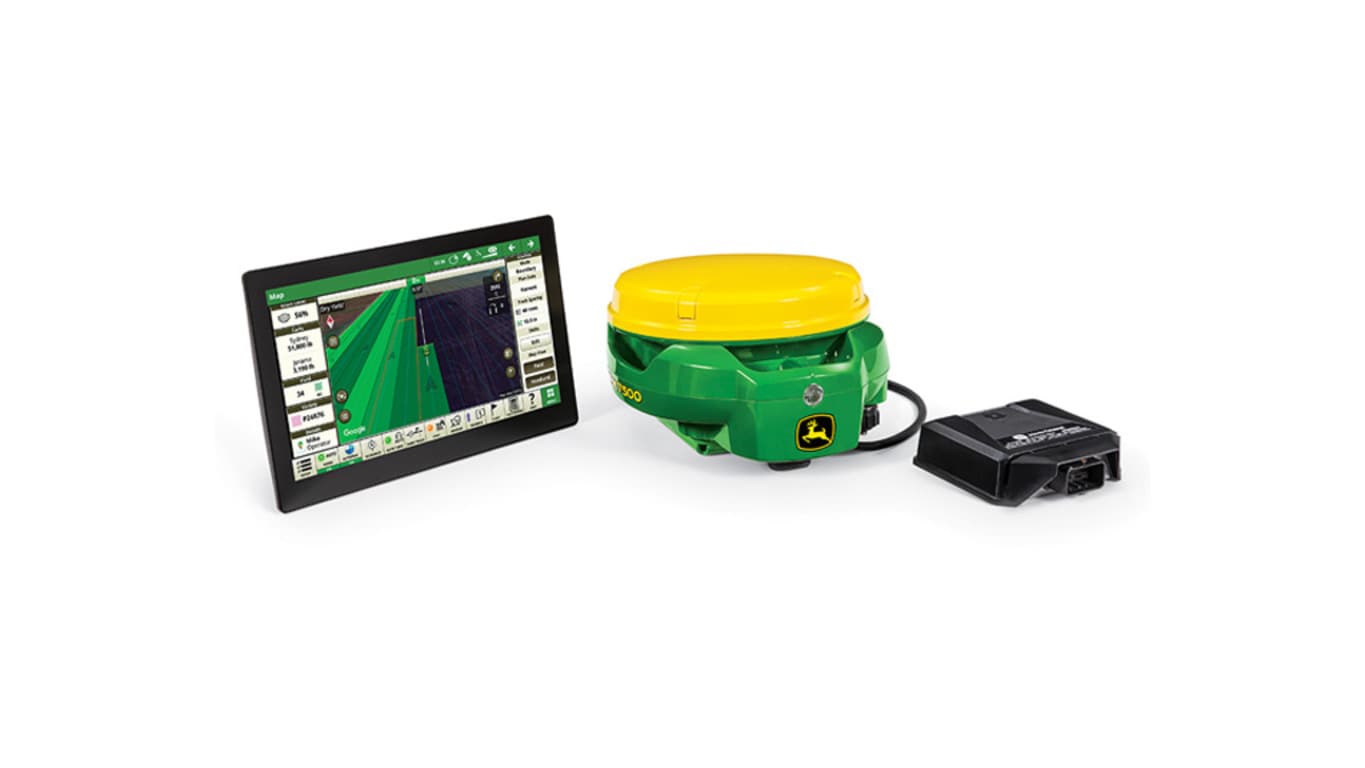

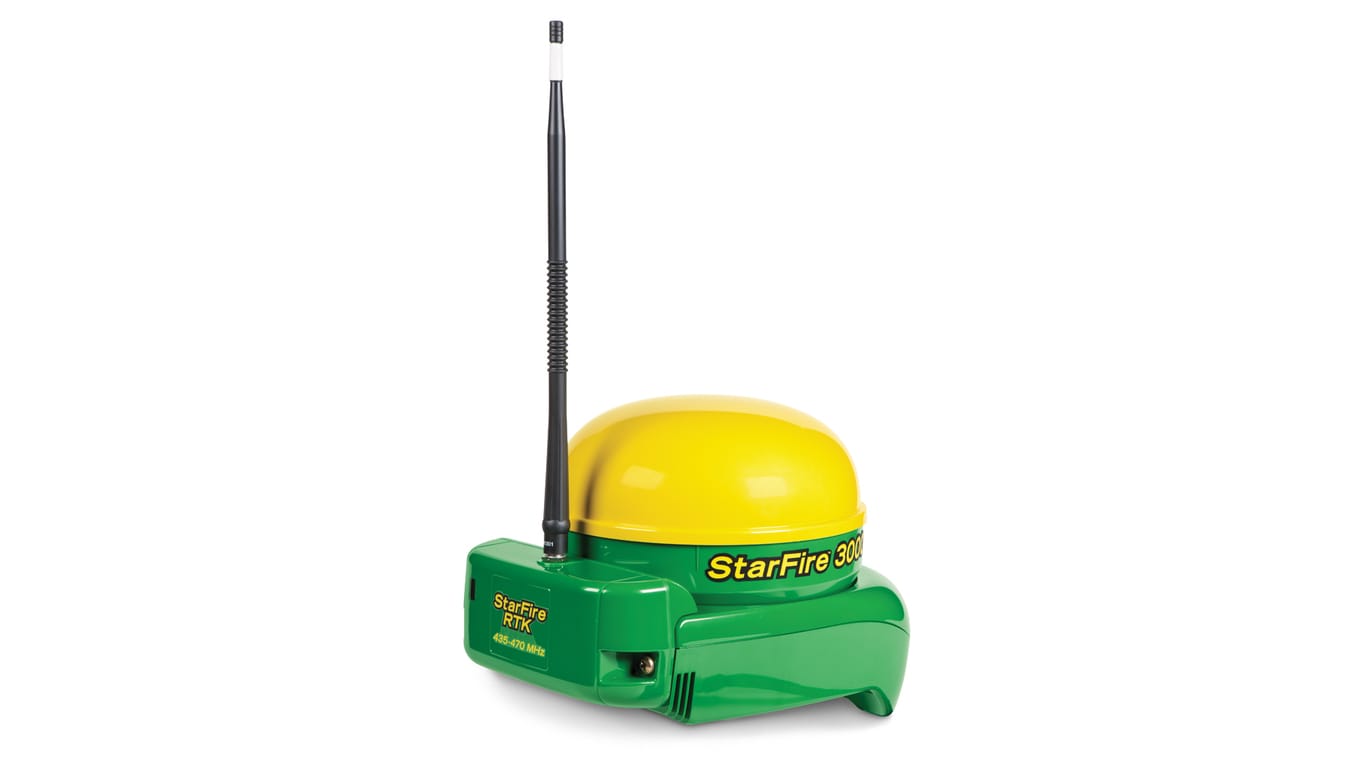
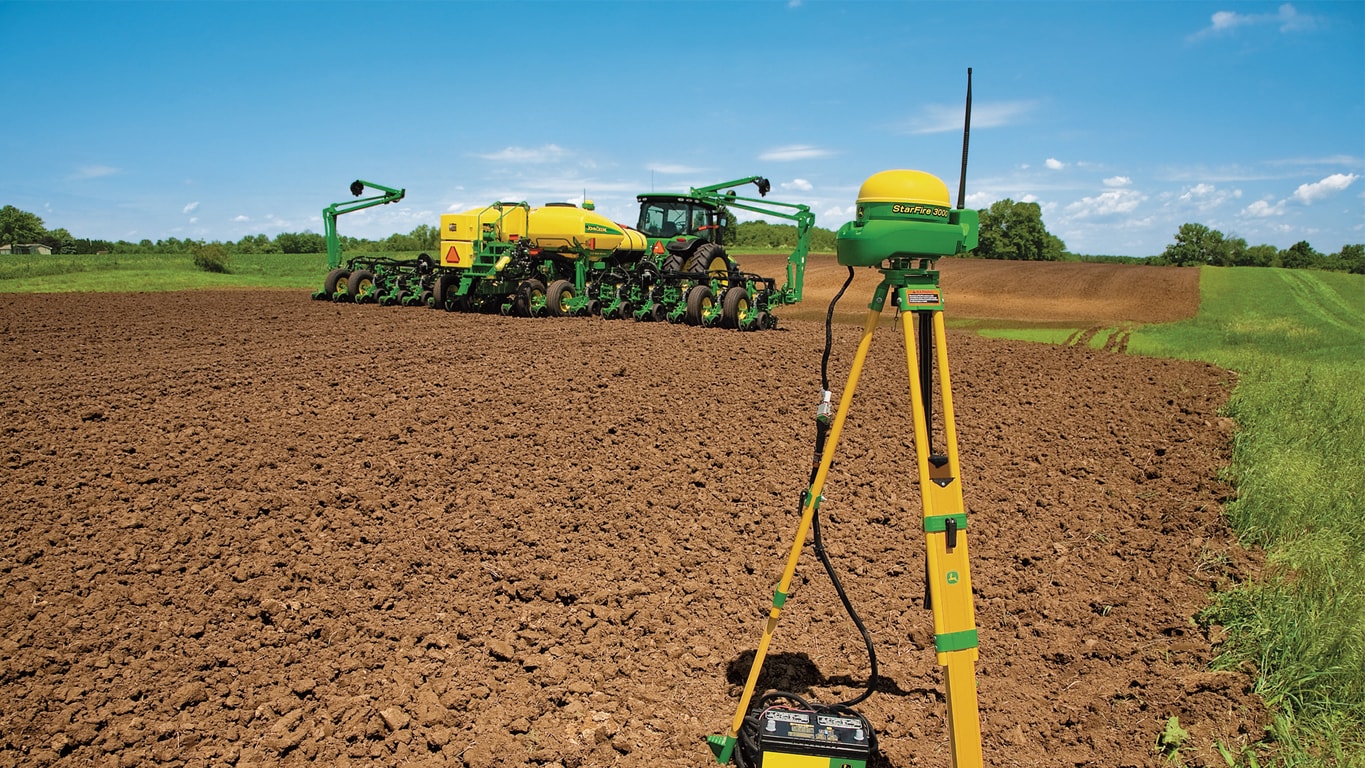
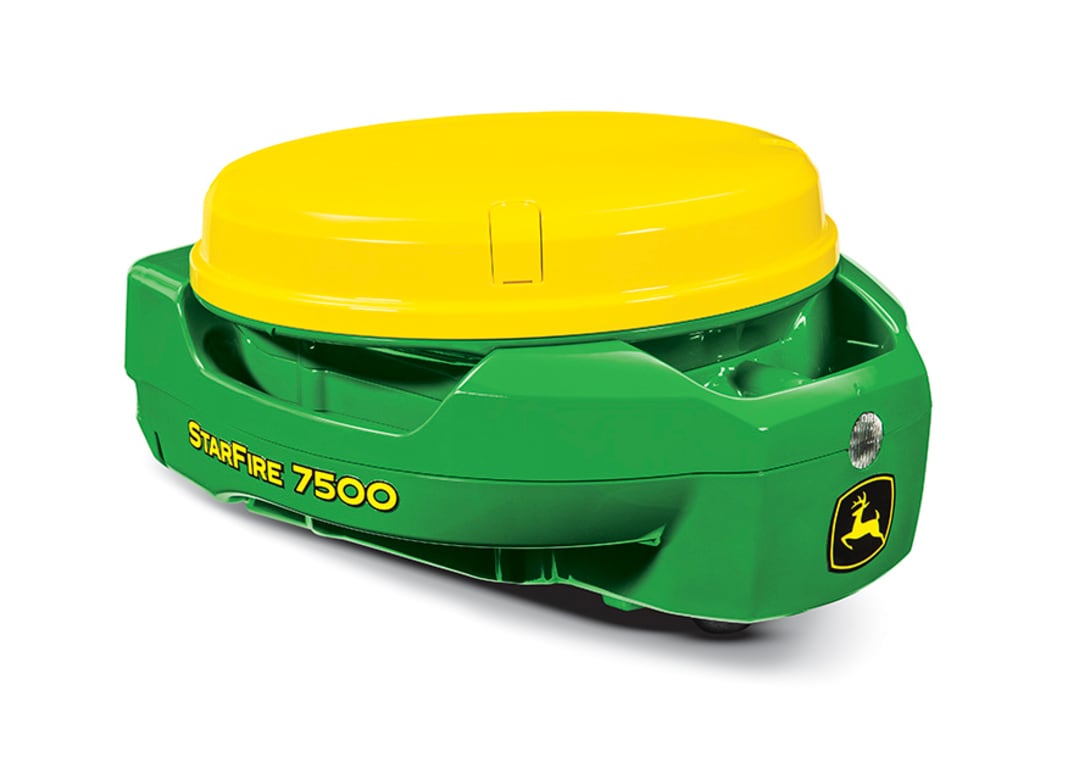
Product features are based on published information at the time of publication. Product features are subject to change without notice. Contact your local John Deere dealer for more information.
1Compared to previous models.